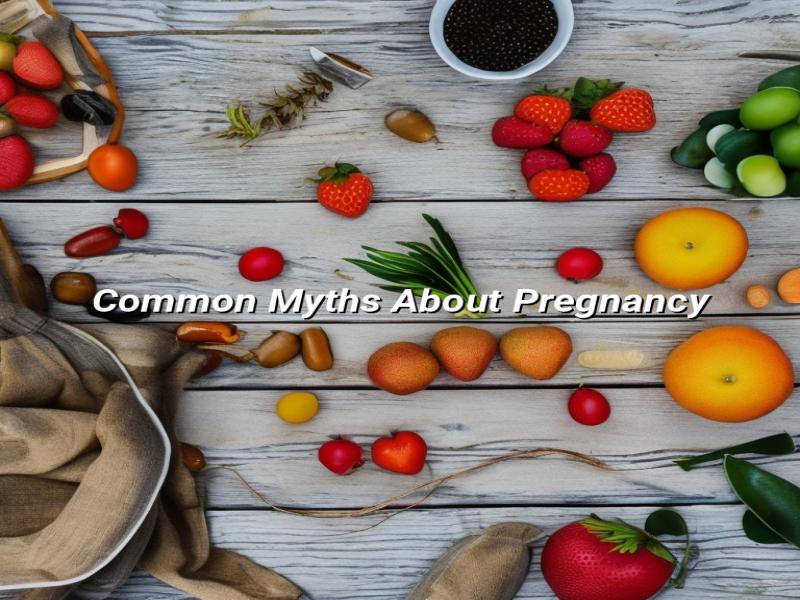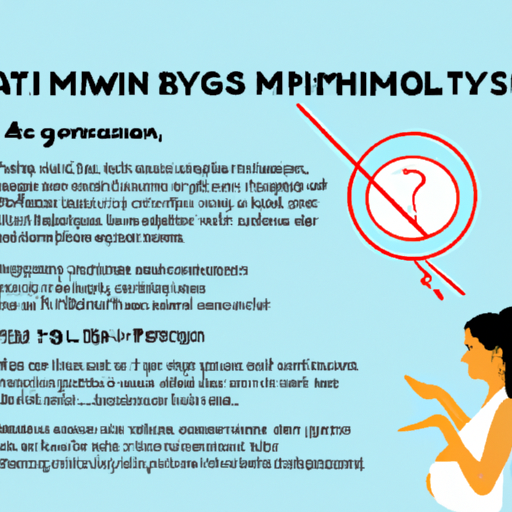Common Myths About Pregnancy

Common Myths About Pregnancy and the Reality Behind Them
Pregnancy is an exciting time, but it can also be filled with a lot of unknowns. With so much information out there, it can be hard to know what’s true and what’s not. Here are some common myths about pregnancy and the reality behind them.
Myth #1: You can’t exercise while pregnant.
Reality: Exercise is actually encouraged during pregnancy. It can help reduce stress, improve sleep, and even reduce the risk of complications. Talk to your doctor about what types of exercise are safe for you and your baby.
Myth #2: You can’t dye your hair while pregnant.
Reality: It’s generally safe to dye your hair while pregnant, but it’s best to avoid chemical treatments like perms and relaxers. Talk to your doctor about any concerns you may have.
Myth #3: You can’t eat certain foods while pregnant.
Reality: While there are some foods that should be avoided during pregnancy, like raw fish and unpasteurized dairy, most foods are safe to eat. Talk to your doctor about any dietary restrictions you may have.
Myth #4: You can’t drink coffee while pregnant.
Reality: While it’s best to limit your caffeine intake during pregnancy, it’s generally safe to have one or two cups of coffee a day. Talk to your doctor about any concerns you may have.
Myth #5: You can’t travel while pregnant.
Reality: Travel is generally safe during pregnancy, but it’s best to talk to your doctor before you go. Make sure you have a plan in place in case of any complications.
Pregnancy can be a confusing time, but it’s important to get the facts. Talk to your doctor about any concerns you may have and remember that you don’t have to believe everything you hear.
The Truth About Eating for Two During Pregnancy
Hey there, mamas-to-be! Congratulations on your pregnancy! We know you’re probably feeling a little overwhelmed right now, so we’re here to help you out with one of the most important aspects of pregnancy: nutrition.
You’ve probably heard the phrase “eating for two” when it comes to pregnancy. But what does that really mean? Well, it doesn’t mean you should double your food intake! In fact, you only need an extra 300-400 calories per day during your pregnancy. That’s about the same as a small snack.
So, what should you be eating? Well, it’s important to focus on nutrient-dense foods like fruits, vegetables, whole grains, lean proteins, and healthy fats. These foods will provide you and your baby with the essential vitamins and minerals you both need.
It’s also important to stay hydrated. Aim for 8-10 glasses of water per day. This will help keep you and your baby healthy and help prevent dehydration.
Finally, don’t forget to take your prenatal vitamins. These are specially formulated to provide you and your baby with the extra nutrients you need during pregnancy.
We know that pregnancy can be a stressful time, but don’t forget to take care of yourself. Eating a healthy, balanced diet is one of the best things you can do for yourself and your baby. So, take it easy and enjoy this special time!
Debunking the Myth of the “Perfect Pregnancy”
We’ve all heard the stories of the “perfect pregnancy” – the one where the mom-to-be glows with health and happiness, and the baby is born without a hitch. But the truth is, there’s no such thing as a perfect pregnancy. Every pregnancy is unique and comes with its own set of challenges.
For starters, there’s the physical toll that pregnancy can take on a woman’s body. From morning sickness to swollen feet, pregnancy can be uncomfortable and even painful at times. And while some women may breeze through their pregnancies with minimal discomfort, others may experience more severe symptoms.
Then there’s the emotional rollercoaster that comes with pregnancy. From the moment you find out you’re expecting, your life is turned upside down. You’re suddenly faced with a million decisions to make, and it can be overwhelming. On top of that, you’re dealing with a whole range of emotions – from excitement and joy to fear and anxiety.
And of course, there’s the risk of complications. While most pregnancies go smoothly, there’s always the chance that something could go wrong. From preterm labor to gestational diabetes, there are a number of potential risks that can arise during pregnancy.
So while it’s natural to want a “perfect” pregnancy, it’s important to remember that there’s no such thing. Every pregnancy is different, and it’s important to be prepared for the unexpected. The best thing you can do is to take care of yourself, stay informed, and trust your instincts.
The Truth About Exercise During Pregnancy
Exercising during pregnancy can be a great way to stay healthy and fit, but it’s important to know the facts before you start. Here’s what you need to know about exercise during pregnancy.
First, it’s important to talk to your doctor before starting any exercise program. Your doctor can help you determine what type of exercise is safe for you and your baby.
Second, it’s important to listen to your body. If you’re feeling tired or uncomfortable, take a break. Don’t push yourself too hard.
Third, it’s important to choose the right type of exercise. Low-impact activities like walking, swimming, and yoga are great options. Avoid activities that involve jumping or contact sports.
Fourth, it’s important to stay hydrated. Drink plenty of water before, during, and after your workout.
Finally, it’s important to stay safe. Wear comfortable, supportive clothing and shoes. Avoid exercising in extreme temperatures or in direct sunlight.
Exercising during pregnancy can be a great way to stay healthy and fit. Just remember to talk to your doctor, listen to your body, choose the right type of exercise, stay hydrated, and stay safe.
Common Myths About Pregnancy and Birth Control
Pregnancy and birth control can be confusing topics, and there are a lot of myths out there that can make it even more confusing. Here are some of the most common myths about pregnancy and birth control, debunked.
Myth #1: You can’t get pregnant if you have sex during your period.
This is false. While it is less likely to get pregnant during your period, it is still possible. Sperm can live in the body for up to five days, so if you have unprotected sex near the end of your period, you could still get pregnant.
Myth #2: Birth control pills are 100% effective.
This is also false. While birth control pills are very effective, they are not 100% effective. The effectiveness of birth control pills depends on how consistently you take them. If you miss a pill or take them at different times each day, the effectiveness of the pill decreases.
Myth #3: You can’t get pregnant if you have sex standing up.
This is false. You can get pregnant no matter what position you have sex in. The only way to prevent pregnancy is to use birth control or abstain from sex.
Myth #4: You can’t get pregnant if you douche after sex.
This is false. Douching after sex does not prevent pregnancy. In fact, douching can actually increase your risk of getting pregnant because it can push the sperm further into the uterus.
Myth #5: You can’t get pregnant if you have sex in a hot tub.
This is false. Hot tubs do not prevent pregnancy. The only way to prevent pregnancy is to use birth control or abstain from sex.
We hope this article has helped to clear up some of the common myths about pregnancy and birth control. Remember, the only way to prevent pregnancy is to use birth control or abstain from sex. If you have any questions or concerns, be sure to talk to your doctor.





